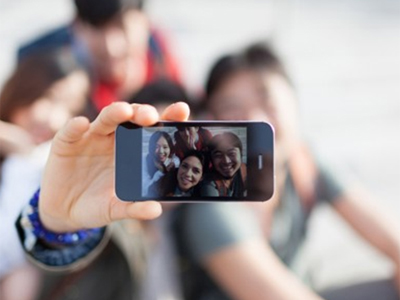



Date:10/04/17
 Smartphone cameras started the selfie photo rage, and it shows no signs of slowing down. However, taking a picture of yourself with your phone can still result in a bad portrait, no matter how many megapixels your camera might have inside. Today, Adobe announced that its research team is exploring new ways to use artificial intelligence and machine learning, powered by Adobe Sensei, to help improve selfie photos.
Smartphone cameras started the selfie photo rage, and it shows no signs of slowing down. However, taking a picture of yourself with your phone can still result in a bad portrait, no matter how many megapixels your camera might have inside. Today, Adobe announced that its research team is exploring new ways to use artificial intelligence and machine learning, powered by Adobe Sensei, to help improve selfie photos.
The company demonstrated what it is working on in a YouTube video. It showed an app that can take a normal selfie photo and then change the image so that the photo looks like it was taken from a greater distance. The app’s tools can turn a selfie image that might see too tight or crooked into one that looks more like a normal head shot taken by someone else. It can even turn a 2D image into one with limited 3D depth. The app can allow you to move the head in the selfie image a bit to get a better angle.
Another special effect shown in the video is called automatic portrait masking. With the tap of a finger, the app can remove the background from the selfie, and then a person can return it to the photo, but with a more pleasing depth of field image effect. It makes it look more like a photo taken with a traditional camera. Finally, the demo video showed how users can search for a photo that you want to mimic for your own selfie portrait in the app, and then automatically apply the filters and other effects from that old photo on your image.
While we have seen smartphone photo editing tools that can clean up parts of a bad selfie image, it looks like the software that Abobe is working on is taking those efforts a couple of steps further. Abode did not say when or if it plans to release an app like the one shown in the demo video, but it’s likely the company will offer something similar to it sometime in the near future.
Your selfies could get much better in the future with help from Adobe
 Smartphone cameras started the selfie photo rage, and it shows no signs of slowing down. However, taking a picture of yourself with your phone can still result in a bad portrait, no matter how many megapixels your camera might have inside. Today, Adobe announced that its research team is exploring new ways to use artificial intelligence and machine learning, powered by Adobe Sensei, to help improve selfie photos.
Smartphone cameras started the selfie photo rage, and it shows no signs of slowing down. However, taking a picture of yourself with your phone can still result in a bad portrait, no matter how many megapixels your camera might have inside. Today, Adobe announced that its research team is exploring new ways to use artificial intelligence and machine learning, powered by Adobe Sensei, to help improve selfie photos.The company demonstrated what it is working on in a YouTube video. It showed an app that can take a normal selfie photo and then change the image so that the photo looks like it was taken from a greater distance. The app’s tools can turn a selfie image that might see too tight or crooked into one that looks more like a normal head shot taken by someone else. It can even turn a 2D image into one with limited 3D depth. The app can allow you to move the head in the selfie image a bit to get a better angle.
Another special effect shown in the video is called automatic portrait masking. With the tap of a finger, the app can remove the background from the selfie, and then a person can return it to the photo, but with a more pleasing depth of field image effect. It makes it look more like a photo taken with a traditional camera. Finally, the demo video showed how users can search for a photo that you want to mimic for your own selfie portrait in the app, and then automatically apply the filters and other effects from that old photo on your image.
While we have seen smartphone photo editing tools that can clean up parts of a bad selfie image, it looks like the software that Abobe is working on is taking those efforts a couple of steps further. Abode did not say when or if it plans to release an app like the one shown in the demo video, but it’s likely the company will offer something similar to it sometime in the near future.
Views: 366
©ictnews.az. All rights reserved.Similar news
- Justin Timberlake takes stake in Facebook rival MySpace
- Wills and Kate to promote UK tech sector at Hollywood debate
- 35% of American Adults Own a Smartphone
- How does Azerbaijan use plastic cards?
- Imperial College London given £5.9m grant to research smart cities
- Search and Email Still the Most Popular Online Activities
- Nokia to ship Windows Phone in time for holiday sales
- Internet 'may be changing brains'
- Would-be iPhone buyers still face weeks-long waits
- Under pressure, China company scraps Steve Jobs doll
- Jobs was told anti-poaching idea "likely illegal"
- Angelic "Steve Jobs" loves Android in Taiwan TV ad
- Kinect for Windows gesture sensor launched by Microsoft
- Kindle-wielding Amazon dips toes into physical world
- Video game sales fall ahead of PlayStation Vita launch





















